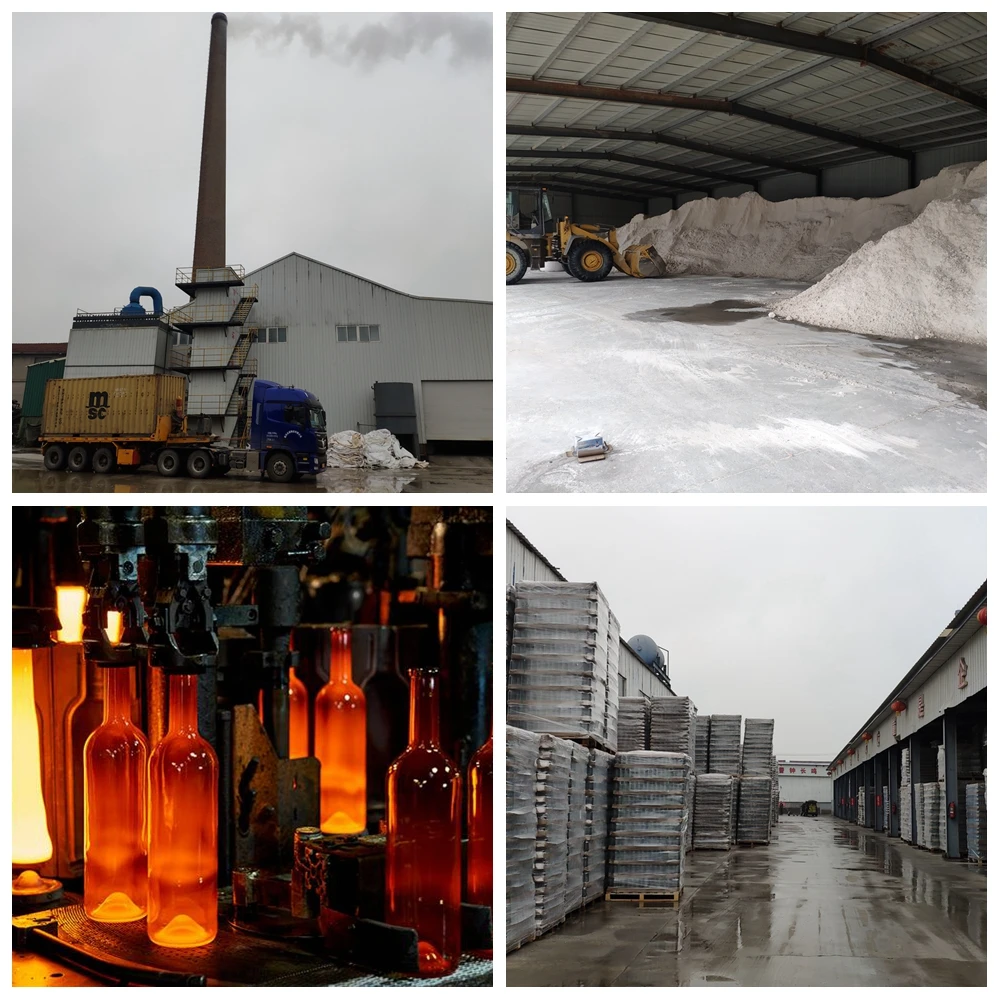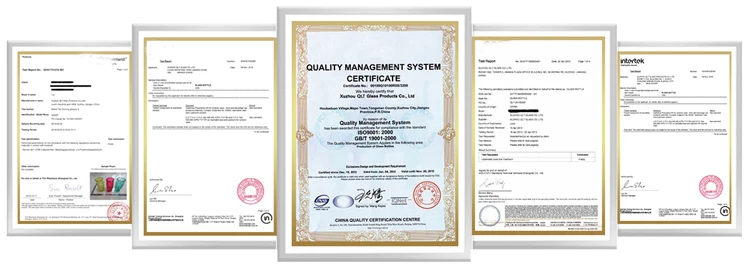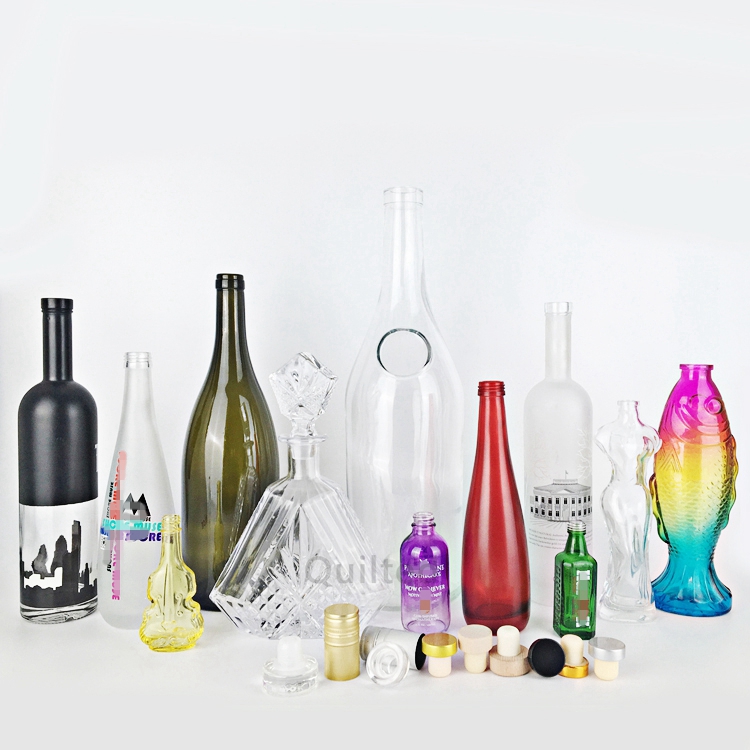From the windows in our homes to the wine bottles on our tables, glass is a cornerstone of modern civilization. As a material that combines functionality with elegance, glass has shaped industries ranging from construction to luxury packaging. At QLT Glass, with 20 years of expertise, we’ve perfected the craft of producing premium glass wine bottles that marry aesthetic brilliance with scientific precision. This article unveils our sophisticated production process and explains why QLT Glass stands as a global leader in glass manufacturing.
1. Raw Materials: The Foundation of Quality
Glass wine bottles begin with meticulously selected raw materials. QLT Glass uses a soda-lime-silica composition optimized for durability and clarity:
- SiO₂ (72%): High-purity quartz sand for structural integrity
- Na₂O (14%): Soda ash as a flux agent
- CaO (10%): Limestone for chemical stability
- MgO & Al₂O₃ (4%): Enhances thermal shock resistance
QLT Glass Advantage:
- 30% Recycled Cullet: Sustainable sourcing reduces carbon footprint
- ISO 14001-Certified Suppliers: Guaranteed purity (99.9% SiO₂)
- AI-Powered Batching: ±0.05% ingredient accuracy
2. Precision Melting: From Batch to Liquid Glass
Our gas-oxy hybrid furnaces melt raw materials at 1,550°C, ensuring homogeneity and clarity:
| Process Stage | Temperature Range | Key Outcome |
| Batch Charging | 25°C → 800°C | Initial decomposition |
| Primary Melting | 800°C → 1,400°C | Silicate formation |
| Refining | 1,400°C → 1,550°C | Bubble removal & homogenization |
Innovation Spotlight:
- Submerged Combustion: Reduces energy use by 25%
- Real-Time Viscosity Sensors: Maintain optimal flow for molding
3. Forming: Shaping Perfection
QLT Glass employs IS (Individual Section) machines for precision forming:
A. Gob Production
- Weight: 150–600g (±0.5g tolerance)
- Temperature: 1,050°C (±10°C)
B. Blow-and-Blow Process
1. Parison Mold: Compressed air shapes the neck finish
2. Final Mold: 12-bar pressure forms the body
3. Ejection: Bottles cooled to 600°C for transfer
Quality Control:
- Laser Scanners: Detect 0.3mm wall thickness variations
- AI Vision Systems: Flag defects ≥50μm
4. Annealing: Eliminating Stress
Our computerized Lehr ovens ensure structural stability:
- Heating Zone: 600°C → 550°C (30 mins)
- Soaking Zone: 550°C → 480°C (45 mins)
- Cooling Zone: 480°C → 70°C (90 mins)
Result: Residual stress <5 μm/cm, preventing spontaneous fractures.

5. Surface Enhancement & Decoration
QLT Glass offers bespoke finishes to elevate brand appeal:
- Hot-End Coating: Tin oxide layer for scratch resistance
- Cold-End Coating: Food-grade polyethylene wax
- Customization:
- Embossing (up to 1.5mm depth)
- Silk-screen printing (Pantone-matched)
- UV-filtering tints (amber, green, cobalt)
6. Rigorous Quality Assurance
Every QLT Glass bottle undergoes 7-stage testing:
1. Verticality Check: <0.5° deviation
2. Leak Test: Withstands 15 bar pressure
3. Thermal Shock: 150°C → 0°C cycles
4. Capacity Verification: ±1% volume tolerance
5. Neck Finish Inspection: Go/No-Go gauges
6. Optical Clarity: 99% light transmission
7. Drop Test: 1.2m onto steel plate
Certifications:
- ISO 9001 (Quality Management)
- FDA 21 CFR (Food Safety)
- BRCGS Grade AA
7. Sustainable Packaging Solutions
QLT Glass pioneers eco-friendly practices:
- Lightweighting: 15% material reduction without compromising strength
- Closed-Loop Recycling: 98% water reuse in production
- Carbon-Neutral Logistics: Partnership with Green Freight Asia
Case Study: A European winery reduced breakage rates by 40% using our reinforced designs, saving €120K annually.

Why Choose QLT Glass?
1. End-to-End Expertise: From raw material sourcing to global delivery
2. Customization: 1,000+ designs, 72-hour prototyping
3. Sustainability: 30% recycled content, solar-powered facilities
4. Global Compliance: Meets EU, FDA, and ASEAN standards
Request a Free Sample Kit
Experience the QLT Glass difference:
✅ 3 Standard Wine Bottle Samples
✅ Technical Specifications Sheet
✅ Custom Design Consultation
Post time: Apr-04-2025

